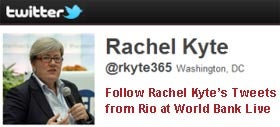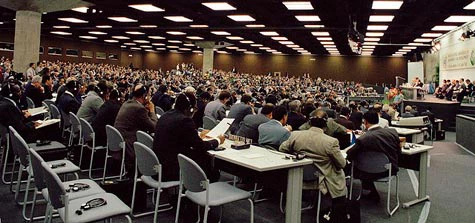Read this post in Français, Español
Photo: The scene at the 1992 Earth Summit in Rio de Janeiro, where the conference adopted the Rio Declaration on Environment and Development and the Agenda 21 programme of action, among other actions. UN Photo/Michos Tzovaras.
This week, the city of Rio de Janeiro will become a global stage, home to tens of thousands of people attending the UN Conference on Sustainable Development.
Rio+ 20 is an important global stage upon which those committed to action from government, the private sector, and society can show how they plan to demonstrate that we can accelerate progress, if we change the way we grow.
We need a different kind of growth, a greener and more inclusive growth. We think it is affordable with help to those for whom upfront costs may be prohibitive. We think we should be able to value natural resources differently within our economic model. We think that with the right data and evidence we can avoid the irreversible costs of making wrong decisions now. And we can have economic systems that are much more efficient.
Our current economic model is enormously inefficient in the way it does or doesn’t use resources. Our recent report Inclusive Green Growth: The Pathway to Sustainable Development lays out opportunities and describes trade-offs. In Rio, we will continue to debunk myths of what an inclusive, green growth path may involve.
We would like to see natural capital accounting, or NCA, adopted by as many countries as possible so governments can value natural resources accurately within our economic systems. We’ve been talking about this for over 20 years, and now that the UN has endorsed the System of Environmental-Economic Accounts, we have a sound basis for moving forward.
NCA is truly an idea whose time has come. Next steps include working through implementation with countries and developing measurement methodologies for ecosystems services. Leaders from companies in the financial and private sectors are joining in. The link between NCA and the ability to develop the new business model of the future is clear. At the same time, integrated reporting is becoming mainstream.
 Inclusive green growth, natural capital accounting, and healthy oceans and their potential to close the food security gap will be our priorities at Rio, but we will also be working with partners and client countries to promote the Sustainable Energy 4 All goals; focusing on innovation in urbanization; emphasizing the importance of integrated landscape solutions to food, water and energy security challenges; and highlighting the fact that we cannot achieve sustainable development for all until women have equal access to economic opportunities. It’s yet more smart economics.
Inclusive green growth, natural capital accounting, and healthy oceans and their potential to close the food security gap will be our priorities at Rio, but we will also be working with partners and client countries to promote the Sustainable Energy 4 All goals; focusing on innovation in urbanization; emphasizing the importance of integrated landscape solutions to food, water and energy security challenges; and highlighting the fact that we cannot achieve sustainable development for all until women have equal access to economic opportunities. It’s yet more smart economics.
Global agreements are important in all aspects of sustainable development. They create the conditions, the market signals, and the alignment necessary to move at speed and scale. But even without them, we can and must move forward.
For the World Bank Group, Rio is a stage we are honored to be able to step up on and to be a partner in delivering progress towards sustainable development.
Rachel Kyte
Vice President for Sustainable Development
www.worldbank.org/sustainabledevelopment
Twitter: @rkyte365



Join the Conversation